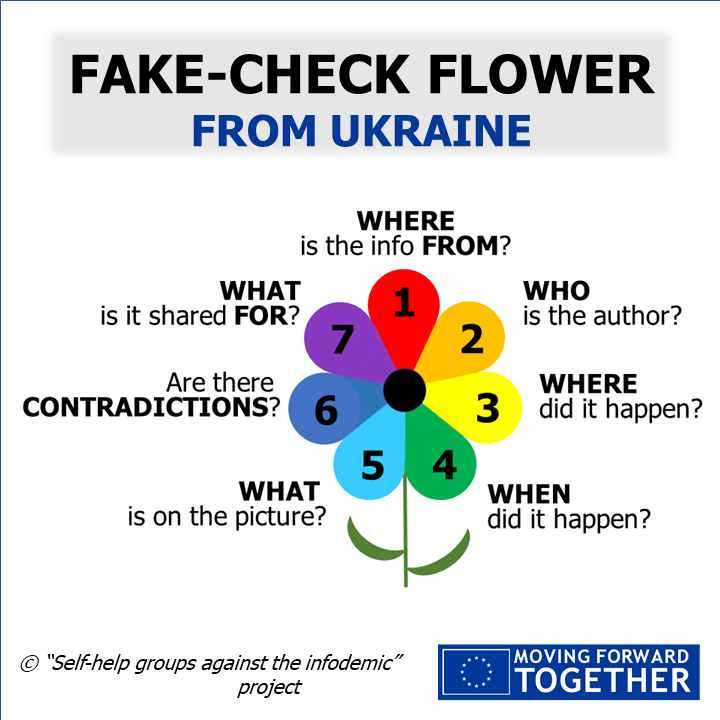Information Security School is the response of Maidan Monitoring Information Center to the challenges facing Ukrainian society and the state, including a hybrid war, and the COVID-19 pandemic, and the bad governance, and the tendency of the majority of the society to believe in all sorts of miracles.
We teach people – those who have realized or felt the need – information hygiene skills, practices of organizing and supporting groups with common interests, skills of effective communication with opponents, and practices of safe existence in information and cyberspace.
We consider the Information Security School a component of the general process of social change in Ukraine: from the post-Soviet pseudo-society to a modern, civilized, European society.
The Information Security School teaches:
- How to practice information hygiene individually and how to spread this practice to your environment.
- How to form invulnerability to harmful, manipulative and hostile information influences individually and how to make your environment resilient.
- How to realize the value of your unique life through understanding your inalienable right to freedom and dignity, and how to help others realize the European values and inalienable rights.
- How to defend common interests and the rights in cooperation with government officials at different levels.
The alumni of Information Security School become agents of change; they actively form a comfortable and safe environment around them, and involve others in such work.
They influence the behavior of central and local government officials, publicists of political parties and public organizations, educators, scientists, doctors, artists, athletes, religious leaders and other thought leaders, encouraging them to learn, improve skills and become responsible citizens of Ukraine.
Since the beginning of the Information Security School project in 2014, we have conducted short trainings for 5,500 people from 16 regions of Ukraine, developed a significant amount of educational and methodological materials. We have developed and implemented new tools for communication with students and alumni, discussion of current issues, activities, analysis of new challenges of information warfare, search for effective answers to those challenges.
Thanks to the support of the European Union in cooperation with the Black Sea Trust for Regional Cooperation in 2020-2021, we had the opportunity to teach 50 people the full School Curriculum, which consisted of 28 hours of interactive learning, 14 hours of homework and 48 hours of seminars to exchange the practical experiences. As a result the Joint Strategy for a Civil Movement to Resist Russian Information Aggression was developed.
The curricula of the Information Security School is constantly updated, new modules are being added, students receive up to date knowledge and skills. For example, in 2020-2021 the students of the School received thorough training in creating and supporting information self-help groups and making one-minute videos.

Traditionally, we focus on sharing the principles of neuroscience, introduction to social networks analysis, rules of netiquette and the Internet usage (use of e-mail, social networks, apps, messengers, videoconferencing, other communication channels) to protect privacy and safeguard the reference circle from possible crimes, practices for the proper and efficient use of computers and software.
We maintain and develop the network of self-help groups. New people ready for long-term work in the community are joining the network.
Recently, a new module of the School “How to organize distance work and learning getting the most benefits and pleasure and a minimum of fatigue and negative emotions” was developed and successfully tested. This module, as our pilots confirmed, is timely, given the circumstances of the COVID-19 pandemic. We consider it as a tool for disseminating information about the School and attracting new people.
When developing the School’s teaching materials, we constantly communicate with Ukrainian colleagues, as well as with experts from NATO member states and the European Union.
We see the further development of the Information Security School in:
- Promoting the success stories of our alumni and the tools they have mastered with our help.
- Expanding cooperation with NATO and EU information security experts.
- Improving existing and creating new forms and tools to support our alumni.
- Development and implementation of tools for monitoring the behavior of government officials, publicists of political parties and public organizations, educators, scientists, doctors, artists, athletes, religious leaders in the information space of Ukraine.
- Introduction of elements of our Social Intermediaries School into the curriculum of the Information Security School to strengthen information self-help groups and transform them into groups of defense of common interests.
6. Promotion of the Information Security School, providing training for civil servants, businesspersons and their employees. Development of commercial educational products focused on the specifics and needs of target groups.
We express our deepest gratitude to the European Union and the Black Sea Trust for Regional Cooperation for supporting our project “Information Self-Help Groups”, which enabled us to train the leaders of such groups, and inspired us to develop and promote the Information Security School.
Read how the idea of information self-help groups evolved “Pray because tomorrow will be the end of the world”: how an activist from Vinnytsia fights fake news on COVID-19




